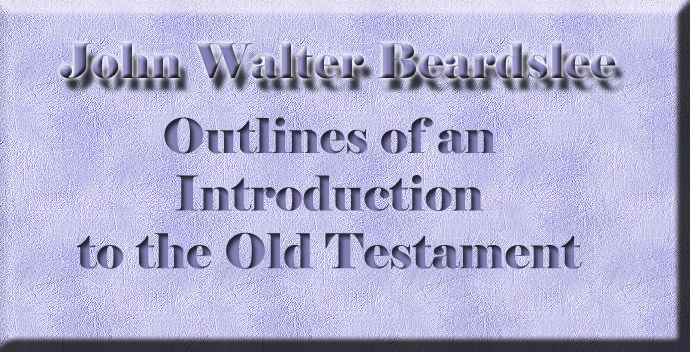
Outlines of an Introduction to the Old Testament
By John Walter Beardslee
The Torah or Law
Leviticus
|
I. Name In the Hebrew the name is Wa-yikra, "and he called," these being the first words of the book. The name Leviticus comes to us through the Greek and signifies matters pertaining to the Levitical services. Among the later Jews it is frequently called Torah Kohanim, "Law of Priests." II. Contents The book has a specific theme, priestly regulations, which is everywhere kept in view, but in its details it does not follow a logical order as closely as the two books which precede it. This may, however, be largely explained from the fact that the different topics treated frequently overlap each other. The following is a general outline: 1. Laws respecting sacrifice, Chs. 1-7. — Instructions are here given concerning the Burnt Offering, Ch. 1, the Meal Offering, 2; the Peace Offering, 3; the Sin Offering, 47-5:13, and the Trespass Offering, 5:14-67. Instructions in regard to making these offerings are found in Chs. 6 and 7. 2. The institution of the priesthood. Chs. 8-10. — Moses first consecrates Aaron and his sons to the priesthood, 8; and after eight days they present their first offerings, 9; consisting of an offering for the priest and then an offering for the people. Nadab and Abihu, two priests, sons of Aaron, are slain because they offer strange fire before Jehovah, 10:1-7. The priests are forbidden to drink wine while exercising their priestly functions, 10:8-11; and their portion of the sacrifice is defined, 10:12ff. 3. Laws defining clean and unclean. Chs. 11-16. — Clean and unclean animals, 11; uncleanness arising from child-birth, 12; leprosy and its treatment, 13:1-15:33; and rules for the day of atonement, 16. 4. The law of holiness. Chs. 17-27. — Laws regulating personal holiness, Chs. 17-20; laws for securing purity of the priests, Chs. 21 and 22; laws defining sacred seasons, Chs. 23 and 24; laws respecting idolatry and the Sabbath, with admonitions in regard to observing them, Chs. 25-27. The relation between Exodus and Leviticus is evident, not only from the opening words of Leviticus which join it to the former book, but also in the matters treated. In Exodus Moses receives the command to build the tabernacle and in Leviticus he proceeds at once to arrange for the orderly performance of divine service in it. Much discussion has arisen over the origin and arrangement of these laws. In the book itself it is said of them, "Jehovah spake unto Moses," 4:1, or "Jehovah spake unto Moses and to Aaron," 11:1, or "Jehovah spake unto Aaron," 10:8. We note also that Moses is told to speak unto the children of Israel, 12:1, 2, to command Aaron and his sons, 6:9, to speak unto Aaron and his sons and all the children of Israel, 17:2, while at 7:37, 38 and at 26:46 words occur which seem as though they were intended to be the end of the book. These facts do not necessarily imply that the book was the outgrowth of a long period during which laws were added as occasion arose, as many critics assume, but maybe explained as sections added by Moses himself, who received instruction at different times at Sinai and wrote them as he received them, or we may suppose that they were added during the wanderings of Israel, while Moses was their leader and recorded by him as he was about leaving them.
|
|
 |
 |
|
|
|
-
Site Navigation
 Home
Home What's New
What's New Bible
Bible Photos
Photos Hiking
Hiking E-Books
E-Books Genealogy
Genealogy Profile
Free Plug-ins You May Need
Profile
Free Plug-ins You May Need
 Get Java
Get Java.png) Get Flash
Get Flash Get 7-Zip
Get 7-Zip Get Acrobat Reader
Get Acrobat Reader Get TheWORD
Get TheWORD